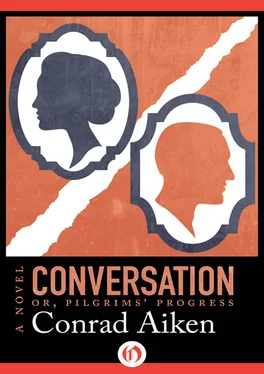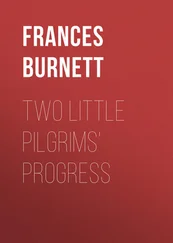He heard Enid crossing the dining room — perhaps she was going to play the piano again? That melancholy and tender little waltz, with its series of murmured unanswerable questions. But no, she had gone on, had crossed the hall, he heard the two-toned squeak of the studio door, she was in the studio. Lighting the fire, perhaps, drawing the brown curtains, settling herself with her knitting; but, whatever she did, studiously ignoring the latest picture on the easel. Adolescent, of course! It was the old cry, the old war cry. Why don’t you grow up, Tip? Why not, indeed! Damn.
The doors to his own and Enid’s rooms were open, and he went into Enid’s to look for a moment from the north window toward the lagoons at the head of the river — he knew in advance how they would be sheeted with moonlight, as in winter they would be sheeted with ice. A single green light twinkled at the Point — somebody must be in Paul’s boathouse, probably Paul himself going out in his canoe. A tiny ticking sound reached his ear — it was Enid’s wrist watch, lying forgotten on her pillow, the small radium dial glowing faintly and hopefully in the dark. Why should there be something so moving, so touching in that — why, suddenly, did it make him think of death? Ridiculous. He straightened up, glanced through the open door beyond, which led into his own adjoining room, then returned into the hall, blew out the candle, and went slowly down the stairs.
In the studio, Enid was already sitting before the fire, her knees crossed, her back to the easel. The firelight flickered rosily on her face, her throat, her hands, flashed along the moving steel needles, twinkled in the buckles of her sandals. The bare white walls danced with light, the whole room seemed to be breathing flame. He went around her, turned the easel away, towards the bookcase, then approached the hearth and pushed back a log with the toe of his shoe.
“Besides, what I don’t see is,” she spoke without looking up, frowning prettily, the green flame-washed eyes lowered to the narrow strip of jersey which dangled from her needles, “what you can possibly get out of it.”
“Oh, for heaven’s sake, Enid—!”
“What I don’t see is what possible good it can do you. I could understand your sacrificing yourself, and even me and Buzzer—”
“Sacrifice!”
“—if there were any real use in it. If they were useful connections, I mean. You won’t live in New Bedford or Boston, where you might pick up portrait commissions, or steady teaching—”
“I don’t want to do portraits.”
“—you throw away chances like that, and the connections I could have given you, for which I should have supposed some sacrifices might have been justified, and then live in this dreary little village where there’s no life at all for me—”
“It’s the first time I’d heard of that !”
“Well, it’s high time you did hear of it, for it’s true, and if you’d had any consideration you’d have thought of it yourself. And then, as if all that wasn’t enough, Tip, you make life more difficult still by associating with these really shabby and dreadful people. What earthly use can Roth be to you — or those dirty little females—”
“Really, Ee—!”
“Yes, dirty !”
“Roth’s a little cheap, and I know it, but he’s a good painter. Or interesting, anyway — by gosh, he’s at least alive , which is more than you can say for those Boston mummies! What’s more, it seems to me this is a question for me to decide. Not you. I must take what’s good where I can find it, that’s all. I’m afraid I don’t find it in the pure waters of County Street — give me the adulterous Greenwich Village sewers any day! And as for picking out my friends merely because they might be useful, good god, Ee, I never heard anything so revoltingly cynical and selfish and utilitarian in my life! You ought to be ashamed.”
“I suppose it’s selfish of me to ask you to consider the futures of Buzzer and myself! Is that it?”
“It isn’t as simple as that.”
“Oh, yes, it is. That’s exactly what it is. There are limits to what you can expect a wife to give up. This notion of living like your noble pioneer ancestors, without help, without maids, doing all our own work, is all very well, but you ask any of your friends what they think of it! Ask Paul, ask George, ask Mabel! I happen to know !”
“I see. So you’ve been crying on the public bosom.”
“I haven’t. They’ve made their feelings only too abundantly clear. And I can assure you it’s very humiliating.”
“Ah. So they’ve been crying on your bosom.”
“Not at all. They’ve merely been rather tactlessly sympathetic. And I assure you I haven’t enjoyed it in the least. It’s not exactly pleasant to have Mabel heavily hinting that you don’t properly provide for us—”
“Mabel! Well, of all the damned impertinence! And do you mean to say you listened to her?”
“Why not?”
“You ought to have turned your back. It’s none of her damned business. That spoiled, empty-headed, card-playing, prattling sybarite! Well, for the love of mud! Really, Enid, there are times when I have to blush for you. And this is certainly one of them.”
“I think you might do a little blushing for yourself.”
“No, thank you!”
She was silent, except for the steady clicking of the needles, her face had hardened (he noticed), with a sort of hard serenity, and he felt that his own face had hardened too, as if in answer. He sat down for a moment on the stool by the fire, but jumped up again, thrust his hands into the pockets of his khaki trousers, went abruptly to one of the front windows. Drawing the curtain a little aside, he looked out across the moonlit street, at the white picket fence of the Rileys’ house. The Riley garden, beyond, was drowned in a sort of milky penumbra, lay entranced in the great cone of pure space-light, the elm trees still and ghostly; and beyond these again, farther off, the white steeple of the Unitarian Church was achieving a lunar brilliance of architecture that made it seem positively to soar. A white night, with a vengeance! Nuit blanche . A light winked on, in an upstairs room of the Riley house, showing a square of yellow curtain, then winked out again. Behind him, from the distant kitchen, he heard the final click, the sighing moan, with which the pump had shut itself off. Enough water till morning. It would serve as an excuse!
He turned back to the room and said:
“I just want to look at the dial. I want to see what the pressure is. If you don’t mind.”
“I thought it was always the same?”
“It’s taken to varying. And sometimes gets too high.”
“Then perhaps you’d better tell Binney about it in the morning.”
“I’ll see!”
“And you might have a look for the cat while you’re there.”
“Oh, he won’t be back all night — it’s the wrong season. He’s away — as Paul so felicitously puts it— ramming !”
There — that would hold her! He couldn’t help chuckling to himself, as he crossed the dark dining room, guided by the path of light from the reflector lamp in the kitchen — dear innocent Ee, how Paul’s quaint vulgarisms always annoyed her! But possibly it wasn’t the best moment he could have chosen for it.… The indicator on the dial was still quivering a little, steadying itself down — thirty-four. Two points too high, there must be something wrong with the shut-off. What next! Temperament in everything, even in pumps, by god! He watched the needle until it finally came to rest, smiled, then turned on the water in the sink. Yes, it gushed too hard, the pressure was obviously too high — another job for Ratio Binney, and another bill. As if a new cesspool wasn’t enough.
Читать дальше












